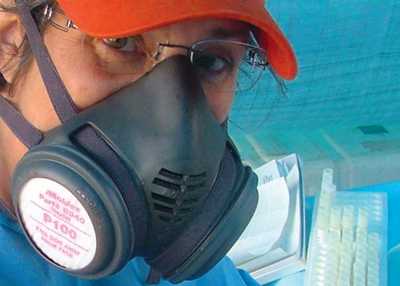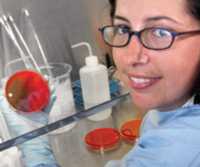CDC Disease Detectives
CDC Disease Detectives [PDF – 831 KB]
CDC disease detectives work 24/7 to save lives and protect people
Disease detectives investigate and use what they’ve learned to prevent others from getting sick. They communicate crucial information quickly about health problems in a community. Their work prevents illness, gets to the root of health problems, and helps people cope in difficult situations.
What disease detectives do

Disease detective John Doe testing environmental samples from chemical explosion
Performing vital research
Disease detectives are officers in CDC’s Epidemic Intelligence Service (EIS). [link]. Many of America’s leading health experts have served as EIS officers.
When disease outbreaks hit U.S. cities or towns — or spread across states — CDC disease detectives work closely with state and local officials. Like investigators at the scene of a crime, these disease detectives begin by looking for clues. They ask:
- WHO is sick?
- WHAT are their symptoms?
- WHEN did they get sick?
- WHERE could they have been exposed to the cause of the illness?
When a health threat appears or a trend becomes evident, we may not know right away why or how many people are
affected, but CDC has the world-class expertise and state-of- the-art equipment to find out what is making people sick or die and what to do about it.
Communicating crucial information quickly
Once disease detectives have found the cause of an outbreak, CDC shares it’s recommendations with:
- Doctors, who can determine the best treatments for illnesses.
- Agencies, which advise consumers on safe food preparation and other preventive measures.
- Companies or regulatory agencies, which may recall products.
CDC uses several ways to get the word out:
- Through media
- Through messaging done by local public health departments and others
- On the web
- By using Health Alert Networks bulletins that go straight to the medical community
Preventing illness and helping people cope
Becoming a CDC disease detective

To become a CDC disease detective, you must be a doctor or scientist; then you must complete a special 2-year training program.
CDC disease detectives go into harm’s way to track down the cause of sickness, the germs and how they are spread. It is true that several CDC staff have died in the line of duty. But with the right training and equipment, our disease detectives can stay safe even while doing field work in difficult conditions.
The work of CDC disease detectives helps to slow or stop outbreaks and other health threats. It also helps people cope during health emergencies. Accurate information that arrives quickly reduces fear. And that helps communities avoid protests, or other disruptive behavior.
About our disease detectives
Some of our experts are epidemiologists. Epidemiology is the method of study that allows our experts to get to the root of health problems and outbreaks in a community.
Epidemiologists are disease detectives. So are laboratory scientists, statisticians, physicians and other healthcare providers, and public health professionals.
Disease detectives at work
Salmonella outbreak: Disease detectives determined that a single African dwarf frog breeding facility in California was the source of a salmonella outbreak between 2009-2011.
Anthrax: During the 2001 anthrax outbreak among U.S. postal workers, disease detectives investigated the route of contaminated envelopes and how workers became infected.
E. coli: Disease detectives found that an outbreak of E. coli was linked to raw sprouts from a farm in Germany in 2011. The sprouts were taken off the shelves, and fewer people got sick.
To learn more about disease detectives and the CDC, visit www.cdc.gov or call 1–800–CDC–INFO.
- Page last reviewed: February 18, 2016
- Page last updated: February 18, 2016
- Content source:


 ShareCompartir
ShareCompartir